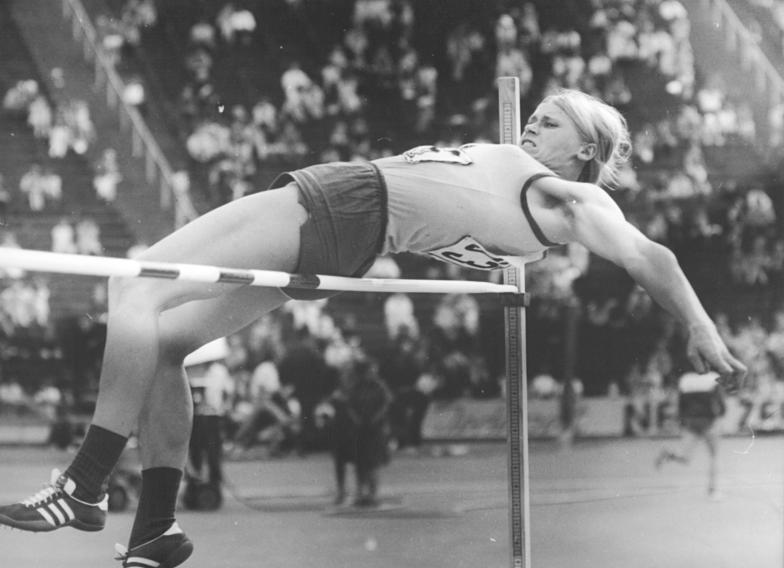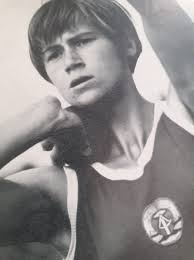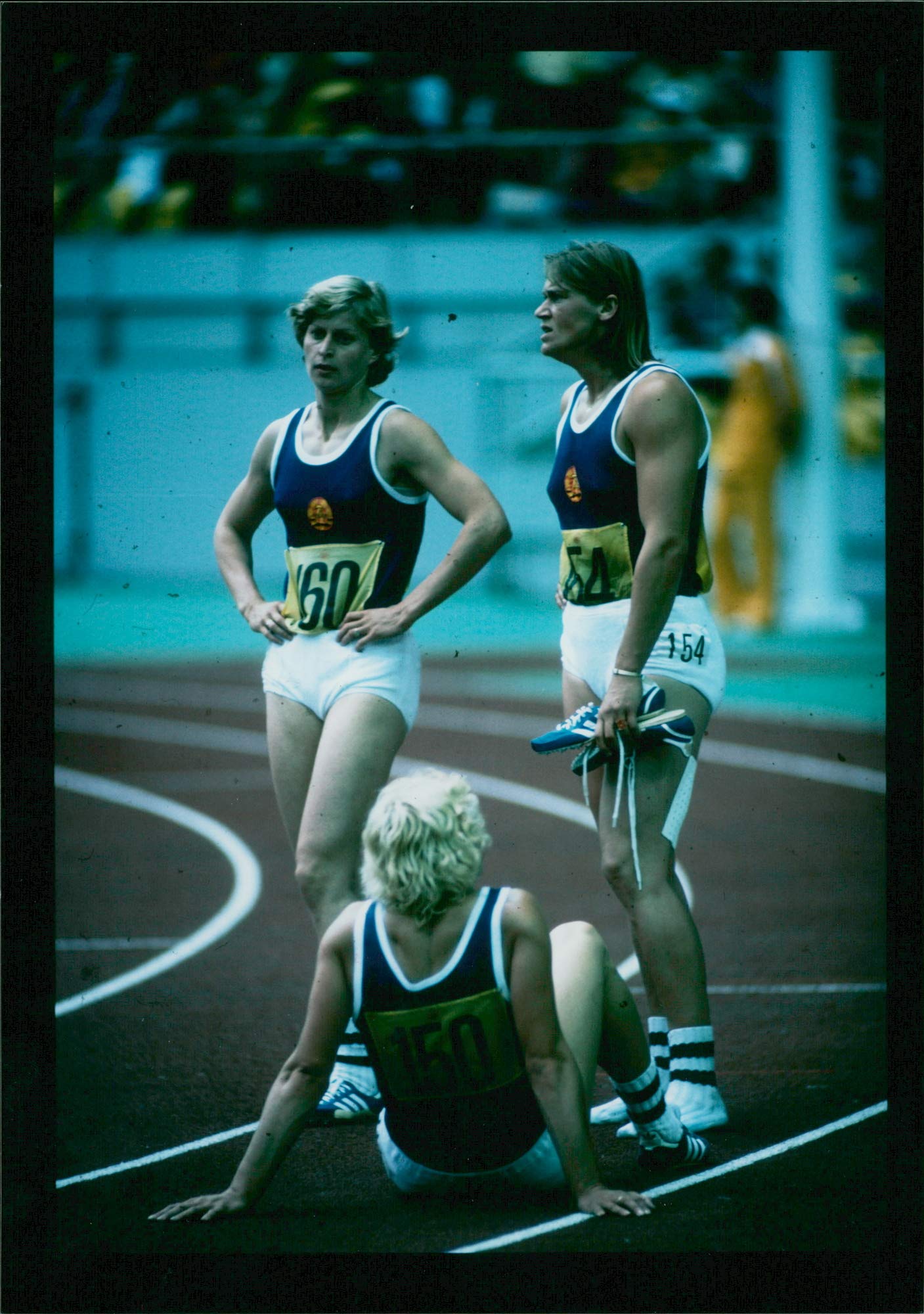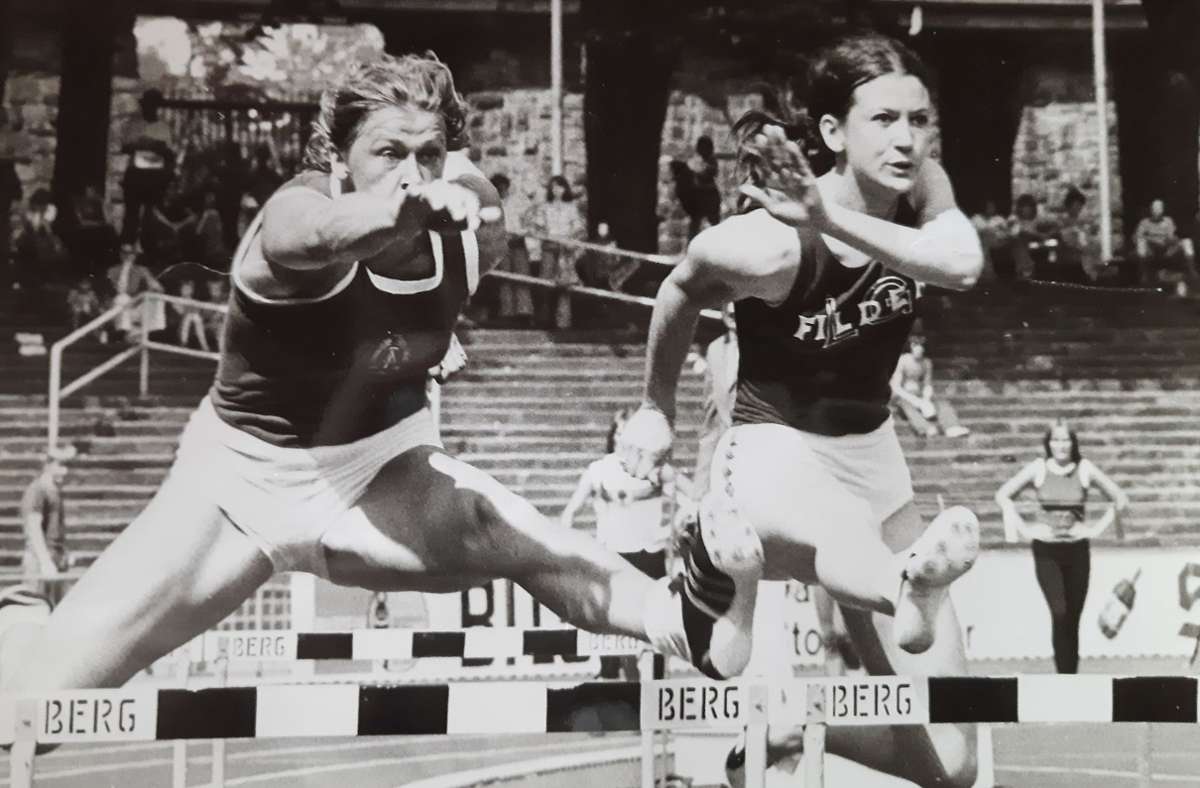Burglinde Pollak: A Lasting Legacy in Women’s Athletics (0)
BURGLINDE POLLAK (GDR)
Born in Altplötzin (Werder (Havel) on 10th June 1951, Burglinde raised as tall and strong girl and yet in 1965 won GDR Champs at Triathlon for “Mädchen”… Two years later she surpassed for the first time 4000 points limit in Pentathlon (4260 by old scores) and achieved 11.5 at 80 m hurdles. Her coach since then was well known Heinz Rieger (the father of long jumper Peter Rieger 8.13 m). Her measures were at the time height 1.81m, weight 72 kg.
Sport world heard about her at first during Second European Junior Games in Leipzig 1968. Pollak won Gold medal at Pentathlon in 4717 points (11.3 at 80 m hurdles; 13.00 at SP; 1.54 at HJ; 5.96 at LJ and 24.9 at 200 m), well ahead of Soviet Tatyana Bychkova (4582), although the runner-up long jumped 6.25 m. Burglinde won the title yet 17, a year younger than her rivals…..
In post Olympic 1969 Pollak improved further her score to 4834 points, but was some disappointed with only eighth place at EC in Athens (4598 old score)…..
In 1970 Pollak made great results improvement. She won each of her Pentathlon contests – Sofia (5089), Schielleiten (5131), Tallinn (5085), Berlin (5241) and finally conquered the World record of 5406 points (100 m hurdles 13.3; SP 15.57; HJ 1.75 (straddle); LJ 6.20; 200 m 23.8) scored in Erfurt on 05-06 September. Only a week later West German Heide Rosendahl approached the mark in only a …. 7 points – 5399 (100 m hurdles 13.1; SP 13.31; HJ 1.70; LJ 6.56; 200 m 23.1)…. At the beginning of November 1970 Pollak travelled to Cuba where tried a single 400 m and ….recorded 54.8 sec in Havana.

Burglinde commenced 1971 with good indoor appearances (60 m hurdles 8.4 and Long jump 6.41). She proceed with excellent score during the summer – personal best at 100 m hurdles (13.1) and almost touched her own NR in Pentathlon – 5371 (13.3; 15.43; 1.70; 6.21; 23.6). But later European Champs in Helsinki were real disaster for her. Pollak led firmly after first three events 100 m hurdles 13.34; SP 16.11; HJ only 1.64 Fosbury but 136 points ahead of Rosendahl. At the beginning of second day Pollak could leap only at 6.10 against mighty 6.69 m of Rosendahl. The gap between both melted to only 23 points before the last discipline – 200 m. Heide Rosendahl was definitely faster in 23.80 to Pollak’s 24.11. So Burglinde lost the overall with only 24 points (5275 vers Rosendahl’s 5299 points).
Pollak started up Olympic 1972 with World Indoor pentathlon best set in Senftenberg on 19th February – 4490 points (13.8; 14.92; 1.66; 6.12; 24.6). The summer season was opened with 4677 in Potsdam on 21th May, proceed with 4730 points in Zurich (04 June) (13.54; 15.88; 1.73; 6.15; 23.7). Two weeks later (in Potsdam) Pollak added to 4759 (13.3; 15.85; 1.70; 6.37; 24.0).
Burglinde was the hot favorite for Olympics in Munich at the beginning of September. But she couldn’t open up with the time that she was eager to. She was drawn up in the first heat (along with Rosendahl) and finished second (13.53) to Rosendahl’s 13.34). But in next second heat Christine Bodner (GDR) 13.25 and veteran Mary Peters (13.29) were even faster. Pollak made 16.04 m (PB) in Shot putting, but even better was Peters (16.20). After two events Peters led in 1920 to Pollak’s 1879 and Rosendahl’s 1873 points.
Pollak took 1.76 m in her first attempt and failed three times at 1.78. At the same time 33 years old Mary Peters advanced to 1.82 m (Rosendahl was desperately back with only 1.65). So in overnight Peters was ahead (2969), followed by Pollak (2872), Tikhomirova (USSR) 2744, Bodner (GDR) 2709 and only fifth Rosendahl (2668).
At the next day morning Pollak could manage only 6.21 m verse mighty 6.83 m of Rosendahl and 5.98 of Peters. Christine Bodner herself achieved pb of 6.40 m. So before the last event (200 m) Peters stood first (3871), Pollak second (3824) and Rosendahl third (3750). At last event (200 m) Pollak straggled at the straight finishing third (23.93), just behind Rosendahl (22.96) and Bodner (23.66). So at the end Mary Peters (fourth with pb of 24.08) finally won the gold in new WR of 4801 points (1971 tables), ahead of Rosendahl (4791 p.) (also above old WR). Pollak remained disappointingly (only herself) third (with bronze medal) with amount of 4768 points.
Her second post Olympic year appeared as most successful in her entire sport carrier. Yet on 27th May in hometown Potsdam (Burglinde was a member of ASK Vorwärts Potsdam) she scored 4624 (13.6; 15.43; 1.73; 6.20; 24.7). Her next Pentathlon was in Erfurt (just where she made her first WR three years earlier) – 4774 (13.2; 16.07; 1.67; 6.37; 23.8). After another month (Potsdam 15 July) Pollak gave almost identical score – 4726 points (13.1; 15.67; 1.73; 6.04; 24.1)…

At inaugural European Cup of combined events (Semifinal) in Bulgarian capital Sofia Burglinde was furious – 100 m hurdles 13.2; SP 15.40; HJ 1.74 m. At long jump she had real troubles (just when her teammates Schmalfeld 6.57, Margit Herbst-Olfert 6.53 and future Olympic 100 m hurdles Champion Johanna Schaller-Klier 6.31 were secured). Pollak made a couple of miserable leaps – 5.60 & 5.99. Then her coach Rieger adviced her and Burglinde finally leapt to excellent 6.45 in her ultimate jump. Later at last 200 m heat future Olympic LJ champion Angela Schmalfeld (Voigt) finished first (23.60), as Pollak edged the others with 23.70, ahead Vorokhobko (URSS) 23.75 and Olfert 23.82 …… The officials calculated carefully and at last the final countdown was announced – Burglinde improved WR in 4831 points – exactly 30 points above the old mark of British Mary Peters.
Pollak disappeared for month or so (did not compete at all) and returned to the stadium just for European Cup Final in Bonn on 22th September. Pollak was the main pretender for individual victory and began with 13.21 (full electric time) into a headwind ot (-1.51). That meant 971points. Second event was shot putting (15.85) and after it Pollak led already with 1912 points ahead of Ukrainian Nadezhda Tkachenko 1843 points. At third event (High jump) Pollak was third in her group (1.78 pb) and extended her leadership over Tkachenko with 2924 to 2855 points.
The contest was scheduled in just single day and the weather was cool (14 Grad) and a little bit rainy. In the afternoon Pollak had again (like in Sofia) problems with her approach in Long jump – 6.11 & 6.32. In the last moment she gathered “all in one” in her third attempt and … 6.47 m (third personal best so far). Only her compatriots Schmalfeld 6.55 and Olfert 6.51 leapt further. Before last event (200 m) her supremacy was smashing – 3931 points to Tkachenko’s 3787 points. East German and Soviet athletes were drawn in the last fourth 200 m heat. Pollak run urgently to another pb of 23.35 (-0.3) which meant a new superb World record of 4932 points (on 1971 tables)!
Next 1974 for Pollak was not so seminal as the previous. At the beginning of July in Leipzig Pollak made 4684 points (13.6; 15.29; 1.78; 6.13; 24.3). But at her third European in row (in Roma on 4th September) she lost to Nadezhda Tkachenko with exactly 100 points (4676 points 13.36; 15.80; 1.71; 6.19; 24.46). Poor mark in jumps then were caused by her significant weight increase (from 72 kg to 81 kg!!!) and, despite all Pollak’s efforts she couldn’t reach her previous HJ & LJ marks……
1975 was relatively quiet for Pollak – a good score of 4783 points in Dortmund on 03 August (13.1; 16.22; 1.75; 6.08; 24.1) and second consecutive individual Pentathlon victory in Bydgoszcz at European Cup Final on 06th September with 4672 points (13.52; 15.76; 1.69; 6.12; 23.87).

It was hard for Burglinde to maintain her supremacy during Olympic 1976 year as well. First “the new wave” Sigrin Siegl (GDR) yet in May achieved 4813 points (13.4; 13.36; 1.72; 6.80; 23.0), after that Christine Bodner-Laser (GDR) replied with 4692 points. The Soviet trio Popovskaya 4783, Tkachenko 4772 and Vorokhobko 4707 also looked very dangerous! Pollak herself carried good dowry of 4681 points (including miserable 1.65 HJ & 5.85 LJ).
At Olympic stadium (during Pentathlon contest) in Montreal nothing could be predictable and sure after every single event. Both Soviet girls led before the last event: Tkachenko 3788 p., Popovskaya 3772, third was Canadian Diane Jones 3764, fourth Pollak 3764, fifth Bodner-Laser 3757. Siegl was distantly ninth, but ….. In the last 200 m heat Sigrun Siegl stormed to lifetime best of 23.09, followed by Laser 23.48 and Pollak 23.64. After the final calculations, the placement was declared: Sigrun Siegl Olympic champion with 4745 points, second with exactly (!) the same amount stood Laser (Siegl was better than Laser in three (out of five) events (vers two of Laser). For the second consecutive Olympiade Pollak won another bronze medal with 4740 points (only five (!) negligible points lower that her teammates).
Pollak was again eager for revenge and yet on February 1977 scored World indoor Pentathlon record (with 800 m that replaced 200 m from 01 January 1977). The observers were some puzzled of her 4633 points indoors (in Senftenberg near East Berlin) (13.3; 16.07; 1.71; 6.14; 2:16.2). Nevertheless through the entire summer Burglinde made only three Penthatlon’s appearances (4522; 4452 & 4243)…
At the beginning of September 1978 Pollak arrived in Czechoslovak Capital Prague with some not so weighty result of 4638 points (13.4; 16.85; 1.68; 6.25; 2:17.4). At “Strahov” Stadium Burglinde was capable to gather amount not more than 4600 points (13.48; 16.64; 1.65; 6.17; 2:15.00), only a single point ahead of her compatriot Kristine Nitsche. Initially the winner was declared Nadezhda Tkachenko (4744), followed by Hungarian Margit Papp (4655). But later Tkachenko was revealed to fail the doping test and was disqualified. So Papp was promoted to the title and Pollak received unexpected silver medal….

Pre Olympic 1979 appeared like some relaxing period for Pollak (only 4516 (13.52; 16.79; 1.65; 5.85; 2:16.3). For her third Olympiade Burglinde tried to prepare in better shape. In her native Potsdam on 01th June she scored good points of 4707 (13.56; 16.62; 1.71; 6.43; 2:14.76) but most of odds predicted (and later guessed) full Soviet supremacy at “Luzhniki” stadium. The hostesses from USSR performed “clean sweep” – Tkachenko 5083 p. (WR), Rukavishnikova 4937, Kuragina 4875. Blonde Ramona Neubert (GDR) placed fourth in 4698, Margit Papp (Hun) finished fifth 4562 and Pollak completed only sixth in 4553 points (13.74; 16.67; 1.68; 5.93; 2:14.38)…
The new Heptathlon replaced old Women’s Pentathlon version from January 1981. At 30 Pollak decided not to give up and tried a new version of “Mehrkampf”. And not only tried, but succeed to surpass significant score of 6000 points (6022 in Halle on 04th July: 13.65; 16.23; 1.63; 24.73/ 5.88; 34.94; 2:15.36). And that 1981 happened to be the last competitive year for her after 16 years nonstop on the track….
After saying “Good bye” to track & field Burglinde Pollak was educated as a data processor, but later worked as a physiotherapist in her own studio.
Altogether, Burglinde Pollak was GDR Champion in 1970, 1971, 1973, 1974 § 1979. It is also interesting to take a look at her personal bests; 100 m 11.5; 200 m 23.35; 400 m 54.8; 800 m 2:12.39; 100 m hurdles 13.14; HJ 1.78; LJ 6.47; SP 17.21; JT 37.29; Indoors 60 m 7.49; 60 m hurdles 8.14; HJ 1.76; LJ 6.41 m.
Pictures: Wikipedia